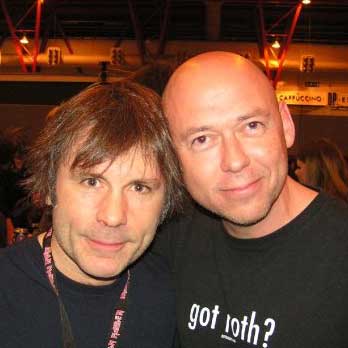“Sometimes I can be brutally honest, and people don't like that. But if you don't like what the answer is going to be, don't ask the question!”: Iron Maiden’s commander-in-chief Steve Harris says that strong leadership is the secret to the band’s success
Plus: how he recently left a Maiden fan in tears

Want all the hottest music and gear news, reviews, deals, features and more, direct to your inbox? Sign up here.
You are now subscribed
Your newsletter sign-up was successful
Iron Maiden has always been Steve Harris’s band.
Bassist Harris put the original Maiden line-up together in 1975 and has steered the ship ever since.
He alone wrote many of the songs on which Maiden’s career was built in the ’80s - deathless heavy metal anthems such as Phantom Of The Opera, the signature song Iron Maiden, The Number Of The Beast, Run To The Hills, Hallowed Be Thy Name, The Trooper, Aces High and Rime Of The Ancient Mariner.
And all of those songs are in the band’s current setlist for their 50th anniversary Run For Your Lives tour, on which they are performing only classic material from the years 1980 to 1992.
Harris laughs when he tells MusicRadar: “Some of our fans weren’t even born when we did those albums. It’s scary!”
In these 50 years there have been many ups and downs for Steve Harris and Iron Maiden. And as the leading figure in the band, Harris has had to make some tough decisions along the way.
“That's never been a fun side of things at all,” he says. “But if there’s a problem, I just tell people how it is. That's how I am.
Want all the hottest music and gear news, reviews, deals, features and more, direct to your inbox? Sign up here.
“I don't tell people what they want to hear. Someone else can do that.
“Sometimes I can be brutally honest, and people don't like that. But the way I see it, if you don't like what the answer is going to be, don't ask the question!”
Harris says without hesitation that the hardest decision he ever had to make was dismissing singer Blaze Bayley in 1999.
Bayley joined Maiden in 1994 as replacement for Bruce Dickinson, and recorded two albums with the band, The X Factor (1995) and Virtual XI (1998).
“I think some of the best songs I've written were on those two albums,” Harris says. “And I always said at the time - and it's been proved to a certain degree later - that people would go back and revisit those albums appreciate them a lot more.
“Some people didn't ever give those albums a chance, but then later on they've gone back to them and realised there’s some really good stuff on them.”
Iron Maiden’s popularity declined in the period when Blaze Bayley fronted the band, and Harris concedes: “That was a challenge. Those were tough times, but other people go through tougher times than that. So it's all relative. I just sort of locked myself away and just got stuck in and got on with it.”
In one sense, Harris relished that challenge. “To a certain degree,” he says. “We were under pressure, so we had to really stick together. And the fans that stuck with us, the ones who came to the shows, were hardcore.”
Harris appreciates how difficult it had been on an emotional level for Blaze Bayley to leave his band Wolfsbane in order to join Iron Maiden.
“That’s the horrible side of it,” he says. “To join us he had to leave them. That’s not nice. But it was an opportunity and it’s not to be taken lightly. You’ve got to go for it.”
Equally, Harris found it hard to tell Bayley he was out after Dickinson agreed to rejoin Maiden.
“That was tough,” Harris says. “But whether you like it or not, you've got to deal with it. It's not nice at times.”
As for the future, Harris admits there is no masterplan.
“We don't really think about what we're going to do next,” he says, “because we don’t know what we’re gonna do next!”
He admits that while creating the 2021 album Senjutsu he had a sense that it could be Maiden’s swan song.
“I suppose at that time I was thinking, well, I just don't know what else we're going to do in the future,” he says. “I just thought: I’m gonna throw everything bar the kitchen sink in there with those four songs I did on my own.”
Those four tracks were all lengthy epics. Lost In A Lost World clocks in at 9:31. The others all run beyond 10 minutes: Death Of The Celts (10:20), The Parchment (12:29) and Hell On Earth (11:19).
Harris chose the latter three to end the Senjutsu album in sequence.
He explains: “When we did those songs, It was pretty obvious - to me anyway - that Hell On Earth was going to be the last song on the album. It just felt right to be the last song.”
Harris says of these long and complex songs: “A lot of the stuff we've done recently takes a lot more listening. It's not instant. But then some of that stuff lives with you for longer. Well, that’s what I like to believe, anyway.
“It can be a little taxing on the audience when we play those songs live,” he admits. “But when you make a new album you’ve got to be proud of it and go out and promote it, not just for the sake of it, but because if it's strong enough it will stand up.
“There’s always gonna be people who go back to the old stuff. If you grew up with the first album, that's probably your favourite album, or one of them, and then people get into certain albums along along the way. Usually their favourite album is what they they first got into.
“Would we want to regurgitate what we did back then? No. Why would you? We’re different people now.
“It's not like we couldn't write like the first album again. We wouldn’t want to.
“I think we’ve done a lot of strong stuff recently, but it’s different - although it always sounds like Maiden!”
He says of the band’s recent albums: “I thought it was good to have different input from different writers, because I think I've got quite a stylised way of writing. And if the other stuff that they're coming in with is really good and takes us in different direction, then all well and good.
“But you can't really analyse it too much. We don't write in advance, we just get together and beaver away. And it is what it is.
“Basically, when we all get together and we work on new material, it's a statement of where we are at the time. It could be pretty different, but it still sounds like Maiden. We have such an identifiable sound, I think, but it’s not like we've set out to be something different.”
Ultimately, Steve Harris remains hugely proud of his band’s global appeal.
“There’s one or two places where we haven’t played,” he says, “but there’s not many left. I'm sure there are places, but I can’t think of many.”
He also describes a recent experience with fans which had a profound effect on him.
“I was in Colombia,” he says. “A stunningly beautiful place. There was a guy and a girl, and they asked for a photo. And when I did it, the guy burst into tears.
“He got really emotional, and I was like, wow. It's amazing what music does to people.
“I get a lot of people saying, ‘I grew up with your music, it's the story of my life.’ And even more amazing to me is when they go, ‘You got me through so many hard times, and you saved my life.’ And I don't know if that’s an exaggeration, but I think maybe not in some cases. It's incredible, really.”

Paul Elliott has worked for leading music titles since 1985, including Sounds, Kerrang!, MOJO and Q. He is the author of several books including the first biography of Guns N’ Roses and the autobiography of bodyguard-to-the-stars Danny Francis.
You must confirm your public display name before commenting
Please logout and then login again, you will then be prompted to enter your display name.



